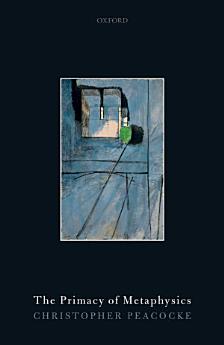The Primacy of Metaphysics
જાન્યુ 2019 · Oxford University Press
ઇ-પુસ્તક
240
પેજ
family_home
પાત્ર
info
reportરેટિંગ અને રિવ્યૂ ચકાસેલા નથી વધુ જાણો
આ ઇ-પુસ્તક વિશે
This volume presents a new view of the relationship between metaphysics and the theory of meaning. What is the relation between the nature of the things you think about, on the one hand, and the ways you think about them on the other? Is the nature of the world prior to the nature of thought and meaning, or not? Christopher Peacocke argues that the nature of the world - its metaphysics - is always involved in thought and meaning. Meaning is never prior to the nature of the world. Peacocke develops a general claim that metaphysics is always involved, either as explanatorily prior, or in a no-priority relationship, to the theory of meaning and content. Meaning and intentional content are never explanatorily prior to the metaphysics. He aims to show, in successive chapters of The Primacy of Metaphysics how the general view holds for magnitudes, time, the self, and abstract objects. For each of these cases, the metaphysics of the entities involved is explanatorily prior to an account of the nature of our language and thought about them. Peacocke makes original contributions to the metaphysics of these topics, and offers consequential new treatments of analogue computation and representation. In the final chapter, he argues that his approach generates a new account of the limits of intelligibility, and locates his account in relation to other treatments of this classical conundrum.
લેખક વિશે
Christopher Peacocke worked for many years in Oxford and London. He was successively a Prize Fellow of All Souls College, a Tutorial Fellow of New College, Susan Stebbing Professor of Philosophy at Kings College London, and finally for twelve years Waynflete Professor of Metaphysical Philosophy at Magdalen College, Oxford. In 2000 he became Professor of Philosophy at New York University. He is currently Johnsonian Professor of Philosophy at Columbia University and Honorary Fellow at the Institute of Philosophy at the School of Advanced Study in the University of London.
આ ઇ-પુસ્તકને રેટિંગ આપો
તમે શું વિચારો છો અમને જણાવો.
માહિતી વાંચવી
સ્માર્ટફોન અને ટૅબ્લેટ
Android અને iPad/iPhone માટે Google Play Books ઍપ ઇન્સ્ટૉલ કરો. તે તમારા એકાઉન્ટ સાથે ઑટોમૅટિક રીતે સિંક થાય છે અને તમને જ્યાં પણ હો ત્યાં તમને ઑનલાઇન અથવા ઑફલાઇન વાંચવાની મંજૂરી આપે છે.
લૅપટૉપ અને કમ્પ્યુટર
Google Play પર ખરીદેલ ઑડિઓબુકને તમે તમારા કમ્પ્યુટરના વેબ બ્રાઉઝરનો ઉપયોગ કરીને સાંભળી શકો છો.
eReaders અને અન્ય ડિવાઇસ
Kobo ઇ-રીડર જેવા ઇ-ઇંક ડિવાઇસ પર વાંચવા માટે, તમારે ફાઇલને ડાઉનલોડ કરીને તમારા ડિવાઇસ પર ટ્રાન્સફર કરવાની જરૂર પડશે. સપોર્ટેડ ઇ-રીડર પર ફાઇલો ટ્રાન્સ્ફર કરવા માટે સહાયતા કેન્દ્રની વિગતવાર સૂચનાઓ અનુસરો.






